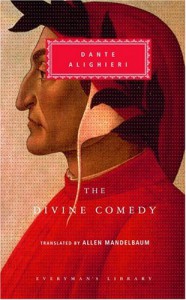The Divine Comedy
 The Divine Comedy is a great work and one of the all time masterpieces. It is my favorite work of Epic Poetry, something that I thought was impossible, because nothing would ever replace the Iliad.
The Divine Comedy is a great work and one of the all time masterpieces. It is my favorite work of Epic Poetry, something that I thought was impossible, because nothing would ever replace the Iliad.Before moving on to my review, I will point out a couple of things that are important in a translation. In addition to the quality of the poetry, you need to have a translation with a good introduction and with copious notes. My policy in reading it was to read the introduction, then read each canto one by one, following up with the notes for that canto before moving on to the next. That worked quite well and allowed me to appreciate the poetry without being completely confused about what is going on.
The Divine Comedy is about the spiritual journey from damnation to salvation told through an extended metaphor of a journey through the afterlife. In the inferno, we are introduced to the various kinds of evils until we finally gaze upon the faces of Satan. In the Purgatory we journey up a mountain, looking at the sacrifices involved in becoming good, until we reach the Garden of Evil. In the Paradise we move through the Heavenly Spheres until coming face to face with God.
Of the three books, Paradise is the worst, I think because writing about Goodness and mysticism is inherently harder than the subject matter of the first two books. Having said that it is still an excellent work, but it is even more demanding than the first two parts.
I am an Atheist, yet despite the intense Christianity of the Divine Comedy, the work as a whole resonates with me profoundly. A brilliant book at every level, it is well worth the effort, although that effort is considerable.
Despite the difference in our world views, I think Dante is a genius and the Divine Comedy one of the great artistic achievements of humanity. Everyone should read it. Furthermore, everyone is very impressed when you reference it, which is a handy bonus from reading it. I reference it quite a bit, because it made quite an impression. Best imagery ever.



